Case Study of Criminal Law: Examining Intoxication and Liability
VerifiedAdded on 2023/06/10
|9
|2769
|442
Case Study
AI Summary
This case study examines criminal liability within the UK legal system, focusing on scenarios involving intoxication. It analyzes the actions of Leon, who entered a shop intoxicated and injured himself, Terry, who acted in self-defense against Leon, Noura, who committed an assault and a potential homicide, and Dr. Mendy, who may be liable for medical negligence. The study delves into the concepts of voluntary and involuntary intoxication, referencing key cases such as DPP v Majewski and R v Kingston, to determine the extent of criminal responsibility. It also explores the principles of self-defense, assault, and medical negligence, highlighting the importance of establishing both actus reus and mens rea to prove criminal liability. The analysis considers relevant legislation, including the Criminal Justice Act and the Criminal Law Act, to assess the culpability of each individual involved. Desklib provides a platform to access similar solved assignments and study resources for students.
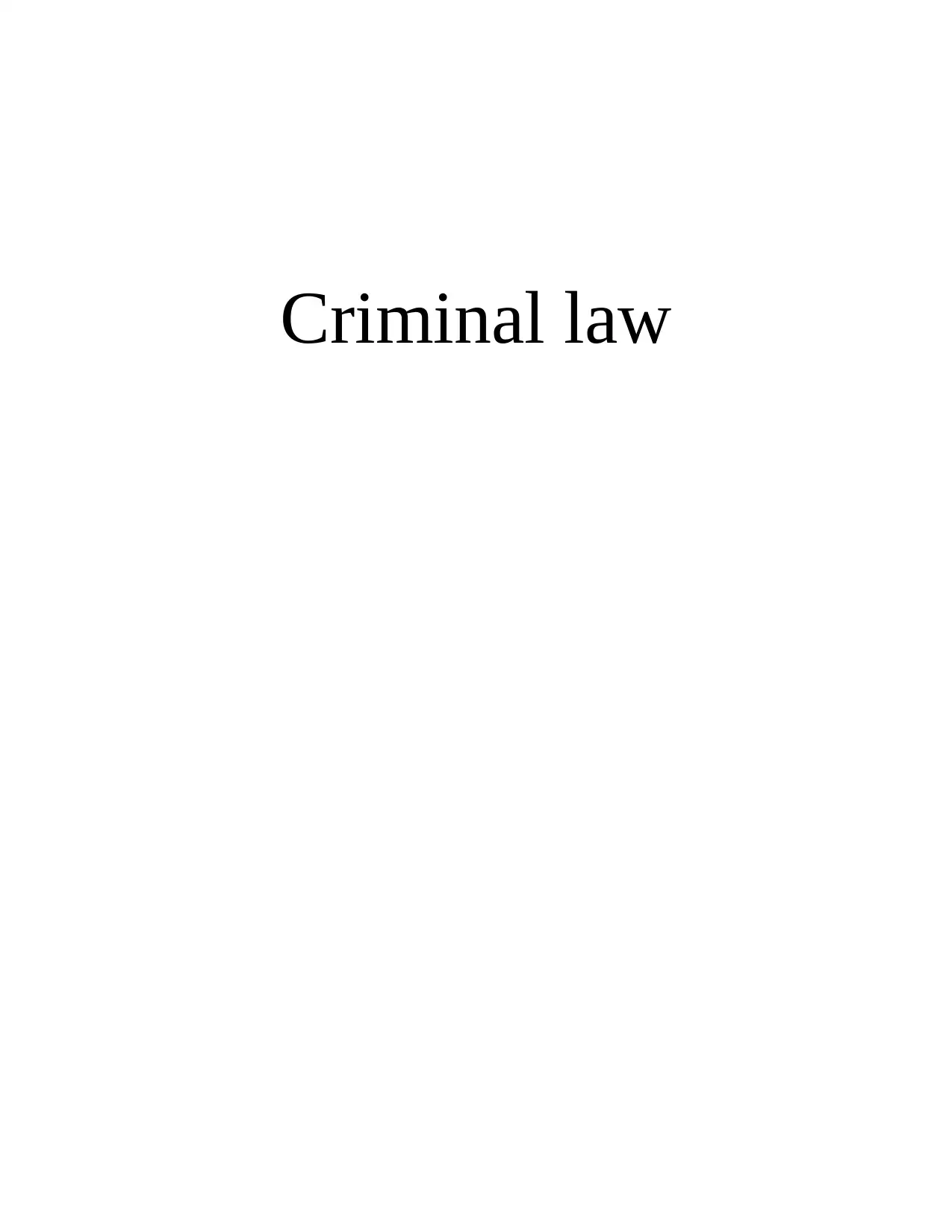
Criminal law
Paraphrase This Document
Need a fresh take? Get an instant paraphrase of this document with our AI Paraphraser

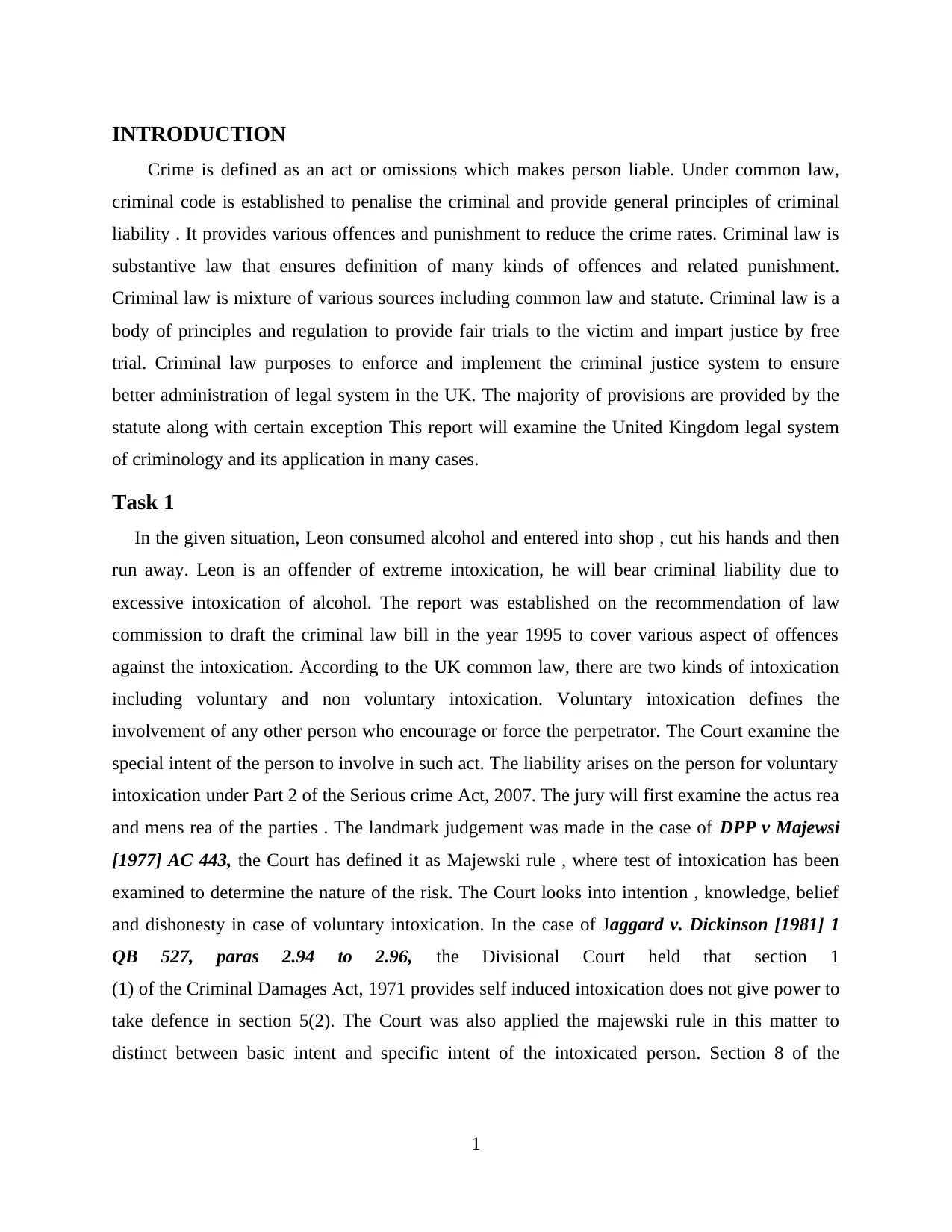
INTRODUCTION
Crime is defined as an act or omissions which makes person liable. Under common law,
criminal code is established to penalise the criminal and provide general principles of criminal
liability . It provides various offences and punishment to reduce the crime rates. Criminal law is
substantive law that ensures definition of many kinds of offences and related punishment.
Criminal law is mixture of various sources including common law and statute. Criminal law is a
body of principles and regulation to provide fair trials to the victim and impart justice by free
trial. Criminal law purposes to enforce and implement the criminal justice system to ensure
better administration of legal system in the UK. The majority of provisions are provided by the
statute along with certain exception This report will examine the United Kingdom legal system
of criminology and its application in many cases.
Task 1
In the given situation, Leon consumed alcohol and entered into shop , cut his hands and then
run away. Leon is an offender of extreme intoxication, he will bear criminal liability due to
excessive intoxication of alcohol. The report was established on the recommendation of law
commission to draft the criminal law bill in the year 1995 to cover various aspect of offences
against the intoxication. According to the UK common law, there are two kinds of intoxication
including voluntary and non voluntary intoxication. Voluntary intoxication defines the
involvement of any other person who encourage or force the perpetrator. The Court examine the
special intent of the person to involve in such act. The liability arises on the person for voluntary
intoxication under Part 2 of the Serious crime Act, 2007. The jury will first examine the actus rea
and mens rea of the parties . The landmark judgement was made in the case of DPP v Majewsi
[1977] AC 443, the Court has defined it as Majewski rule , where test of intoxication has been
examined to determine the nature of the risk. The Court looks into intention , knowledge, belief
and dishonesty in case of voluntary intoxication. In the case of Jaggard v. Dickinson [1981] 1
QB 527, paras 2.94 to 2.96, the Divisional Court held that section 1
(1) of the Criminal Damages Act, 1971 provides self induced intoxication does not give power to
take defence in section 5(2). The Court was also applied the majewski rule in this matter to
distinct between basic intent and specific intent of the intoxicated person. Section 8 of the
1
Crime is defined as an act or omissions which makes person liable. Under common law,
criminal code is established to penalise the criminal and provide general principles of criminal
liability . It provides various offences and punishment to reduce the crime rates. Criminal law is
substantive law that ensures definition of many kinds of offences and related punishment.
Criminal law is mixture of various sources including common law and statute. Criminal law is a
body of principles and regulation to provide fair trials to the victim and impart justice by free
trial. Criminal law purposes to enforce and implement the criminal justice system to ensure
better administration of legal system in the UK. The majority of provisions are provided by the
statute along with certain exception This report will examine the United Kingdom legal system
of criminology and its application in many cases.
Task 1
In the given situation, Leon consumed alcohol and entered into shop , cut his hands and then
run away. Leon is an offender of extreme intoxication, he will bear criminal liability due to
excessive intoxication of alcohol. The report was established on the recommendation of law
commission to draft the criminal law bill in the year 1995 to cover various aspect of offences
against the intoxication. According to the UK common law, there are two kinds of intoxication
including voluntary and non voluntary intoxication. Voluntary intoxication defines the
involvement of any other person who encourage or force the perpetrator. The Court examine the
special intent of the person to involve in such act. The liability arises on the person for voluntary
intoxication under Part 2 of the Serious crime Act, 2007. The jury will first examine the actus rea
and mens rea of the parties . The landmark judgement was made in the case of DPP v Majewsi
[1977] AC 443, the Court has defined it as Majewski rule , where test of intoxication has been
examined to determine the nature of the risk. The Court looks into intention , knowledge, belief
and dishonesty in case of voluntary intoxication. In the case of Jaggard v. Dickinson [1981] 1
QB 527, paras 2.94 to 2.96, the Divisional Court held that section 1
(1) of the Criminal Damages Act, 1971 provides self induced intoxication does not give power to
take defence in section 5(2). The Court was also applied the majewski rule in this matter to
distinct between basic intent and specific intent of the intoxicated person. Section 8 of the
1
⊘ This is a preview!⊘
Do you want full access?
Subscribe today to unlock all pages.

Trusted by 1+ million students worldwide
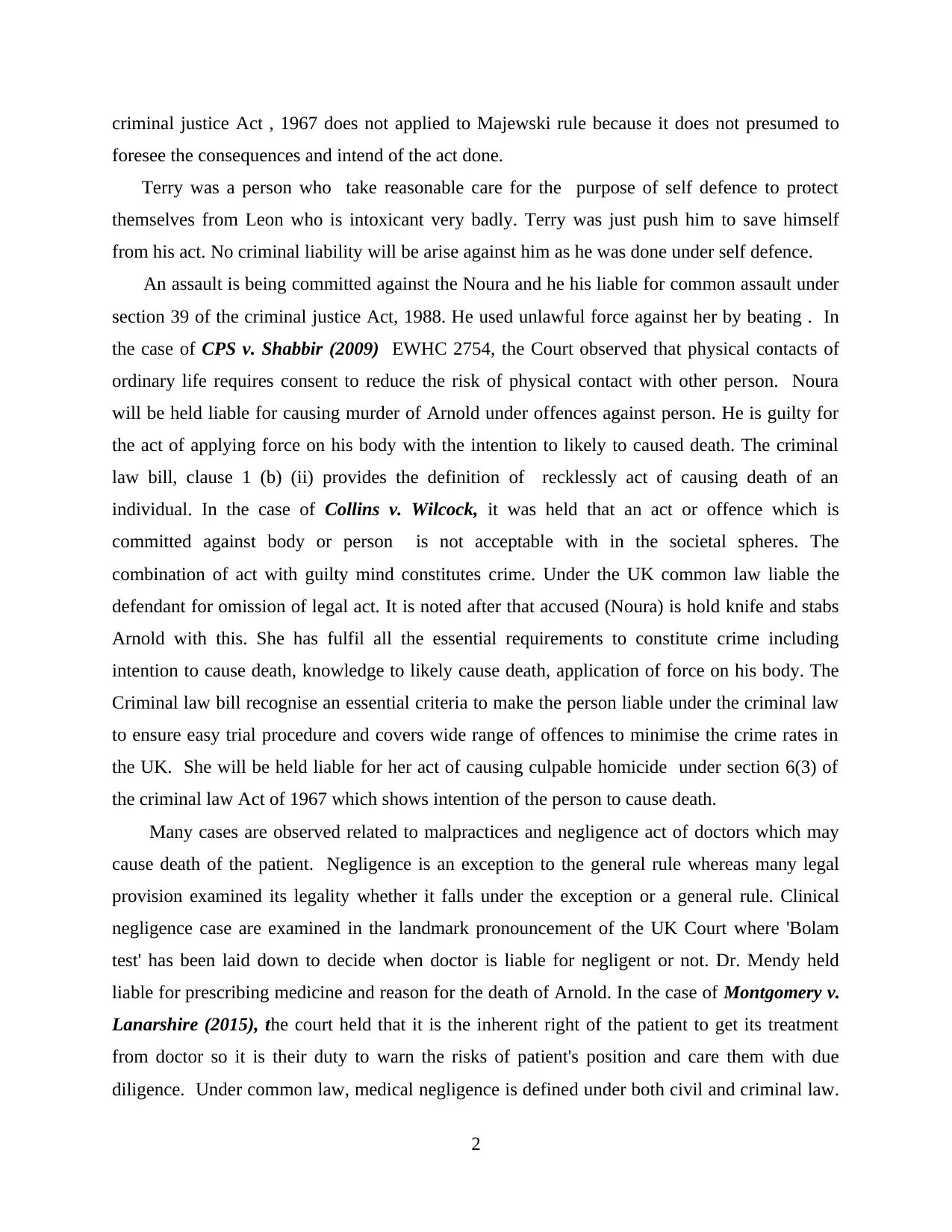
criminal justice Act , 1967 does not applied to Majewski rule because it does not presumed to
foresee the consequences and intend of the act done.
Terry was a person who take reasonable care for the purpose of self defence to protect
themselves from Leon who is intoxicant very badly. Terry was just push him to save himself
from his act. No criminal liability will be arise against him as he was done under self defence.
An assault is being committed against the Noura and he his liable for common assault under
section 39 of the criminal justice Act, 1988. He used unlawful force against her by beating . In
the case of CPS v. Shabbir (2009) EWHC 2754, the Court observed that physical contacts of
ordinary life requires consent to reduce the risk of physical contact with other person. Noura
will be held liable for causing murder of Arnold under offences against person. He is guilty for
the act of applying force on his body with the intention to likely to caused death. The criminal
law bill, clause 1 (b) (ii) provides the definition of recklessly act of causing death of an
individual. In the case of Collins v. Wilcock, it was held that an act or offence which is
committed against body or person is not acceptable with in the societal spheres. The
combination of act with guilty mind constitutes crime. Under the UK common law liable the
defendant for omission of legal act. It is noted after that accused (Noura) is hold knife and stabs
Arnold with this. She has fulfil all the essential requirements to constitute crime including
intention to cause death, knowledge to likely cause death, application of force on his body. The
Criminal law bill recognise an essential criteria to make the person liable under the criminal law
to ensure easy trial procedure and covers wide range of offences to minimise the crime rates in
the UK. She will be held liable for her act of causing culpable homicide under section 6(3) of
the criminal law Act of 1967 which shows intention of the person to cause death.
Many cases are observed related to malpractices and negligence act of doctors which may
cause death of the patient. Negligence is an exception to the general rule whereas many legal
provision examined its legality whether it falls under the exception or a general rule. Clinical
negligence case are examined in the landmark pronouncement of the UK Court where 'Bolam
test' has been laid down to decide when doctor is liable for negligent or not. Dr. Mendy held
liable for prescribing medicine and reason for the death of Arnold. In the case of Montgomery v.
Lanarshire (2015), the court held that it is the inherent right of the patient to get its treatment
from doctor so it is their duty to warn the risks of patient's position and care them with due
diligence. Under common law, medical negligence is defined under both civil and criminal law.
2
foresee the consequences and intend of the act done.
Terry was a person who take reasonable care for the purpose of self defence to protect
themselves from Leon who is intoxicant very badly. Terry was just push him to save himself
from his act. No criminal liability will be arise against him as he was done under self defence.
An assault is being committed against the Noura and he his liable for common assault under
section 39 of the criminal justice Act, 1988. He used unlawful force against her by beating . In
the case of CPS v. Shabbir (2009) EWHC 2754, the Court observed that physical contacts of
ordinary life requires consent to reduce the risk of physical contact with other person. Noura
will be held liable for causing murder of Arnold under offences against person. He is guilty for
the act of applying force on his body with the intention to likely to caused death. The criminal
law bill, clause 1 (b) (ii) provides the definition of recklessly act of causing death of an
individual. In the case of Collins v. Wilcock, it was held that an act or offence which is
committed against body or person is not acceptable with in the societal spheres. The
combination of act with guilty mind constitutes crime. Under the UK common law liable the
defendant for omission of legal act. It is noted after that accused (Noura) is hold knife and stabs
Arnold with this. She has fulfil all the essential requirements to constitute crime including
intention to cause death, knowledge to likely cause death, application of force on his body. The
Criminal law bill recognise an essential criteria to make the person liable under the criminal law
to ensure easy trial procedure and covers wide range of offences to minimise the crime rates in
the UK. She will be held liable for her act of causing culpable homicide under section 6(3) of
the criminal law Act of 1967 which shows intention of the person to cause death.
Many cases are observed related to malpractices and negligence act of doctors which may
cause death of the patient. Negligence is an exception to the general rule whereas many legal
provision examined its legality whether it falls under the exception or a general rule. Clinical
negligence case are examined in the landmark pronouncement of the UK Court where 'Bolam
test' has been laid down to decide when doctor is liable for negligent or not. Dr. Mendy held
liable for prescribing medicine and reason for the death of Arnold. In the case of Montgomery v.
Lanarshire (2015), the court held that it is the inherent right of the patient to get its treatment
from doctor so it is their duty to warn the risks of patient's position and care them with due
diligence. Under common law, medical negligence is defined under both civil and criminal law.
2
Paraphrase This Document
Need a fresh take? Get an instant paraphrase of this document with our AI Paraphraser
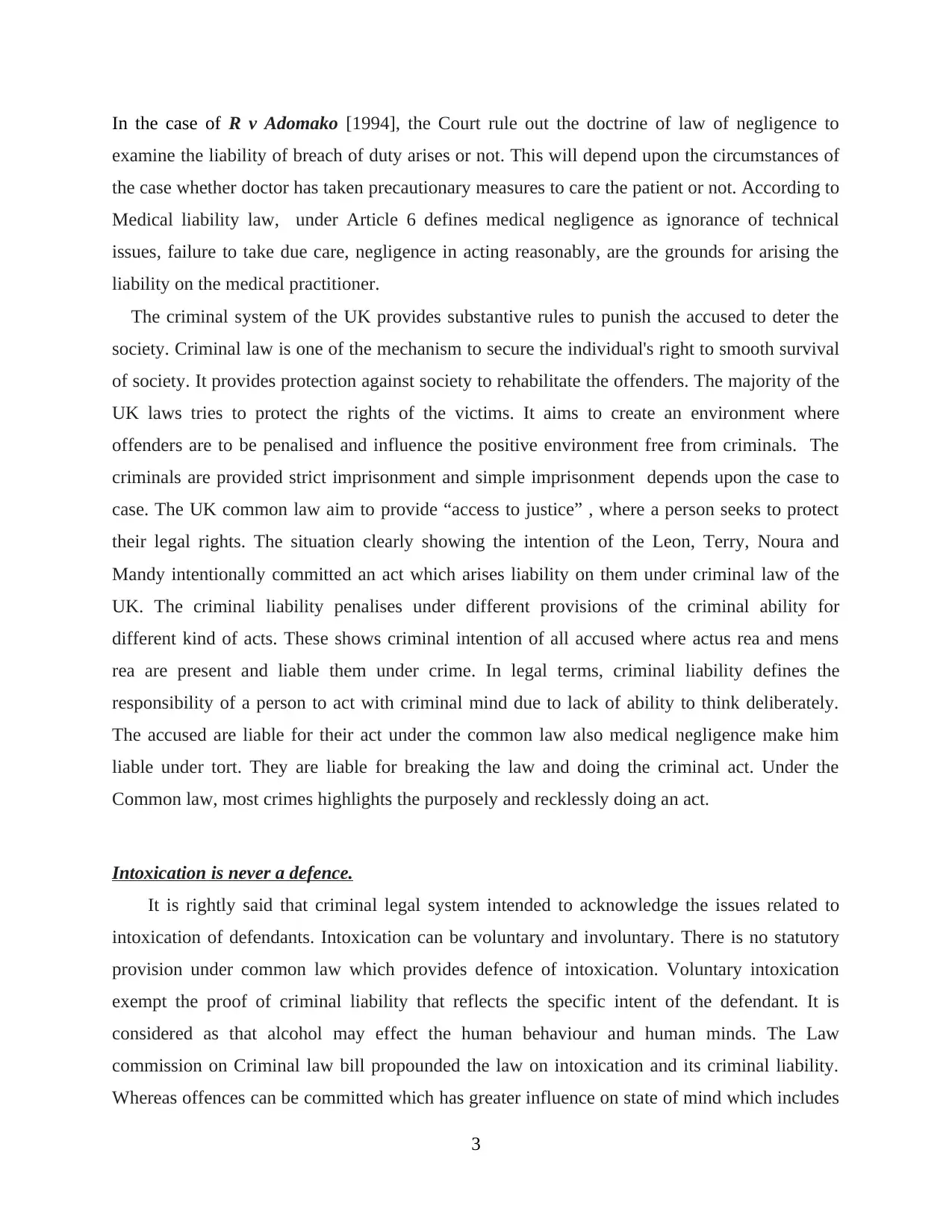
In the case of R v Adomako [1994], the Court rule out the doctrine of law of negligence to
examine the liability of breach of duty arises or not. This will depend upon the circumstances of
the case whether doctor has taken precautionary measures to care the patient or not. According to
Medical liability law, under Article 6 defines medical negligence as ignorance of technical
issues, failure to take due care, negligence in acting reasonably, are the grounds for arising the
liability on the medical practitioner.
The criminal system of the UK provides substantive rules to punish the accused to deter the
society. Criminal law is one of the mechanism to secure the individual's right to smooth survival
of society. It provides protection against society to rehabilitate the offenders. The majority of the
UK laws tries to protect the rights of the victims. It aims to create an environment where
offenders are to be penalised and influence the positive environment free from criminals. The
criminals are provided strict imprisonment and simple imprisonment depends upon the case to
case. The UK common law aim to provide “access to justice” , where a person seeks to protect
their legal rights. The situation clearly showing the intention of the Leon, Terry, Noura and
Mandy intentionally committed an act which arises liability on them under criminal law of the
UK. The criminal liability penalises under different provisions of the criminal ability for
different kind of acts. These shows criminal intention of all accused where actus rea and mens
rea are present and liable them under crime. In legal terms, criminal liability defines the
responsibility of a person to act with criminal mind due to lack of ability to think deliberately.
The accused are liable for their act under the common law also medical negligence make him
liable under tort. They are liable for breaking the law and doing the criminal act. Under the
Common law, most crimes highlights the purposely and recklessly doing an act.
Intoxication is never a defence.
It is rightly said that criminal legal system intended to acknowledge the issues related to
intoxication of defendants. Intoxication can be voluntary and involuntary. There is no statutory
provision under common law which provides defence of intoxication. Voluntary intoxication
exempt the proof of criminal liability that reflects the specific intent of the defendant. It is
considered as that alcohol may effect the human behaviour and human minds. The Law
commission on Criminal law bill propounded the law on intoxication and its criminal liability.
Whereas offences can be committed which has greater influence on state of mind which includes
3
examine the liability of breach of duty arises or not. This will depend upon the circumstances of
the case whether doctor has taken precautionary measures to care the patient or not. According to
Medical liability law, under Article 6 defines medical negligence as ignorance of technical
issues, failure to take due care, negligence in acting reasonably, are the grounds for arising the
liability on the medical practitioner.
The criminal system of the UK provides substantive rules to punish the accused to deter the
society. Criminal law is one of the mechanism to secure the individual's right to smooth survival
of society. It provides protection against society to rehabilitate the offenders. The majority of the
UK laws tries to protect the rights of the victims. It aims to create an environment where
offenders are to be penalised and influence the positive environment free from criminals. The
criminals are provided strict imprisonment and simple imprisonment depends upon the case to
case. The UK common law aim to provide “access to justice” , where a person seeks to protect
their legal rights. The situation clearly showing the intention of the Leon, Terry, Noura and
Mandy intentionally committed an act which arises liability on them under criminal law of the
UK. The criminal liability penalises under different provisions of the criminal ability for
different kind of acts. These shows criminal intention of all accused where actus rea and mens
rea are present and liable them under crime. In legal terms, criminal liability defines the
responsibility of a person to act with criminal mind due to lack of ability to think deliberately.
The accused are liable for their act under the common law also medical negligence make him
liable under tort. They are liable for breaking the law and doing the criminal act. Under the
Common law, most crimes highlights the purposely and recklessly doing an act.
Intoxication is never a defence.
It is rightly said that criminal legal system intended to acknowledge the issues related to
intoxication of defendants. Intoxication can be voluntary and involuntary. There is no statutory
provision under common law which provides defence of intoxication. Voluntary intoxication
exempt the proof of criminal liability that reflects the specific intent of the defendant. It is
considered as that alcohol may effect the human behaviour and human minds. The Law
commission on Criminal law bill propounded the law on intoxication and its criminal liability.
Whereas offences can be committed which has greater influence on state of mind which includes
3
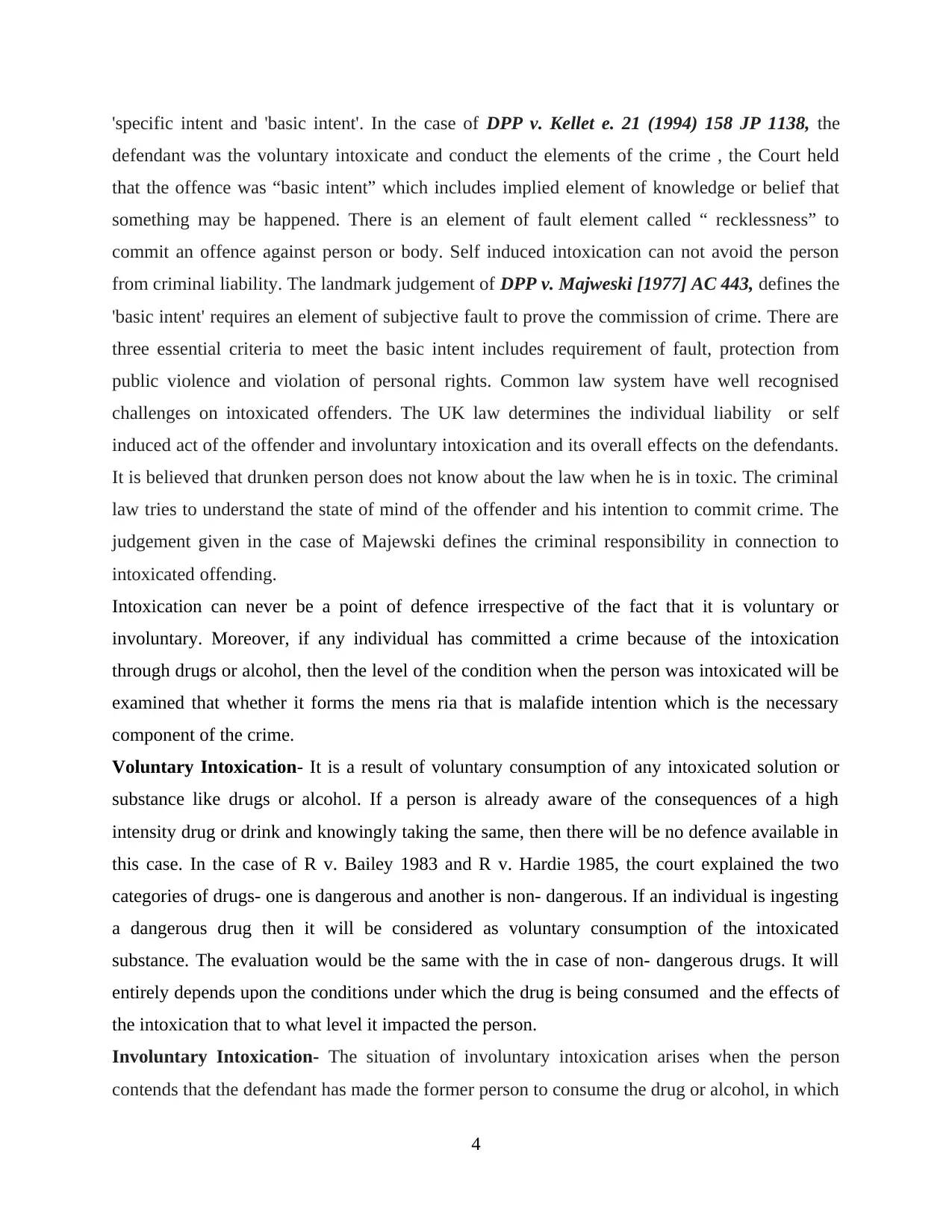
'specific intent and 'basic intent'. In the case of DPP v. Kellet e. 21 (1994) 158 JP 1138, the
defendant was the voluntary intoxicate and conduct the elements of the crime , the Court held
that the offence was “basic intent” which includes implied element of knowledge or belief that
something may be happened. There is an element of fault element called “ recklessness” to
commit an offence against person or body. Self induced intoxication can not avoid the person
from criminal liability. The landmark judgement of DPP v. Majweski [1977] AC 443, defines the
'basic intent' requires an element of subjective fault to prove the commission of crime. There are
three essential criteria to meet the basic intent includes requirement of fault, protection from
public violence and violation of personal rights. Common law system have well recognised
challenges on intoxicated offenders. The UK law determines the individual liability or self
induced act of the offender and involuntary intoxication and its overall effects on the defendants.
It is believed that drunken person does not know about the law when he is in toxic. The criminal
law tries to understand the state of mind of the offender and his intention to commit crime. The
judgement given in the case of Majewski defines the criminal responsibility in connection to
intoxicated offending.
Intoxication can never be a point of defence irrespective of the fact that it is voluntary or
involuntary. Moreover, if any individual has committed a crime because of the intoxication
through drugs or alcohol, then the level of the condition when the person was intoxicated will be
examined that whether it forms the mens ria that is malafide intention which is the necessary
component of the crime.
Voluntary Intoxication- It is a result of voluntary consumption of any intoxicated solution or
substance like drugs or alcohol. If a person is already aware of the consequences of a high
intensity drug or drink and knowingly taking the same, then there will be no defence available in
this case. In the case of R v. Bailey 1983 and R v. Hardie 1985, the court explained the two
categories of drugs- one is dangerous and another is non- dangerous. If an individual is ingesting
a dangerous drug then it will be considered as voluntary consumption of the intoxicated
substance. The evaluation would be the same with the in case of non- dangerous drugs. It will
entirely depends upon the conditions under which the drug is being consumed and the effects of
the intoxication that to what level it impacted the person.
Involuntary Intoxication- The situation of involuntary intoxication arises when the person
contends that the defendant has made the former person to consume the drug or alcohol, in which
4
defendant was the voluntary intoxicate and conduct the elements of the crime , the Court held
that the offence was “basic intent” which includes implied element of knowledge or belief that
something may be happened. There is an element of fault element called “ recklessness” to
commit an offence against person or body. Self induced intoxication can not avoid the person
from criminal liability. The landmark judgement of DPP v. Majweski [1977] AC 443, defines the
'basic intent' requires an element of subjective fault to prove the commission of crime. There are
three essential criteria to meet the basic intent includes requirement of fault, protection from
public violence and violation of personal rights. Common law system have well recognised
challenges on intoxicated offenders. The UK law determines the individual liability or self
induced act of the offender and involuntary intoxication and its overall effects on the defendants.
It is believed that drunken person does not know about the law when he is in toxic. The criminal
law tries to understand the state of mind of the offender and his intention to commit crime. The
judgement given in the case of Majewski defines the criminal responsibility in connection to
intoxicated offending.
Intoxication can never be a point of defence irrespective of the fact that it is voluntary or
involuntary. Moreover, if any individual has committed a crime because of the intoxication
through drugs or alcohol, then the level of the condition when the person was intoxicated will be
examined that whether it forms the mens ria that is malafide intention which is the necessary
component of the crime.
Voluntary Intoxication- It is a result of voluntary consumption of any intoxicated solution or
substance like drugs or alcohol. If a person is already aware of the consequences of a high
intensity drug or drink and knowingly taking the same, then there will be no defence available in
this case. In the case of R v. Bailey 1983 and R v. Hardie 1985, the court explained the two
categories of drugs- one is dangerous and another is non- dangerous. If an individual is ingesting
a dangerous drug then it will be considered as voluntary consumption of the intoxicated
substance. The evaluation would be the same with the in case of non- dangerous drugs. It will
entirely depends upon the conditions under which the drug is being consumed and the effects of
the intoxication that to what level it impacted the person.
Involuntary Intoxication- The situation of involuntary intoxication arises when the person
contends that the defendant has made the former person to consume the drug or alcohol, in which
4
⊘ This is a preview!⊘
Do you want full access?
Subscribe today to unlock all pages.

Trusted by 1+ million students worldwide
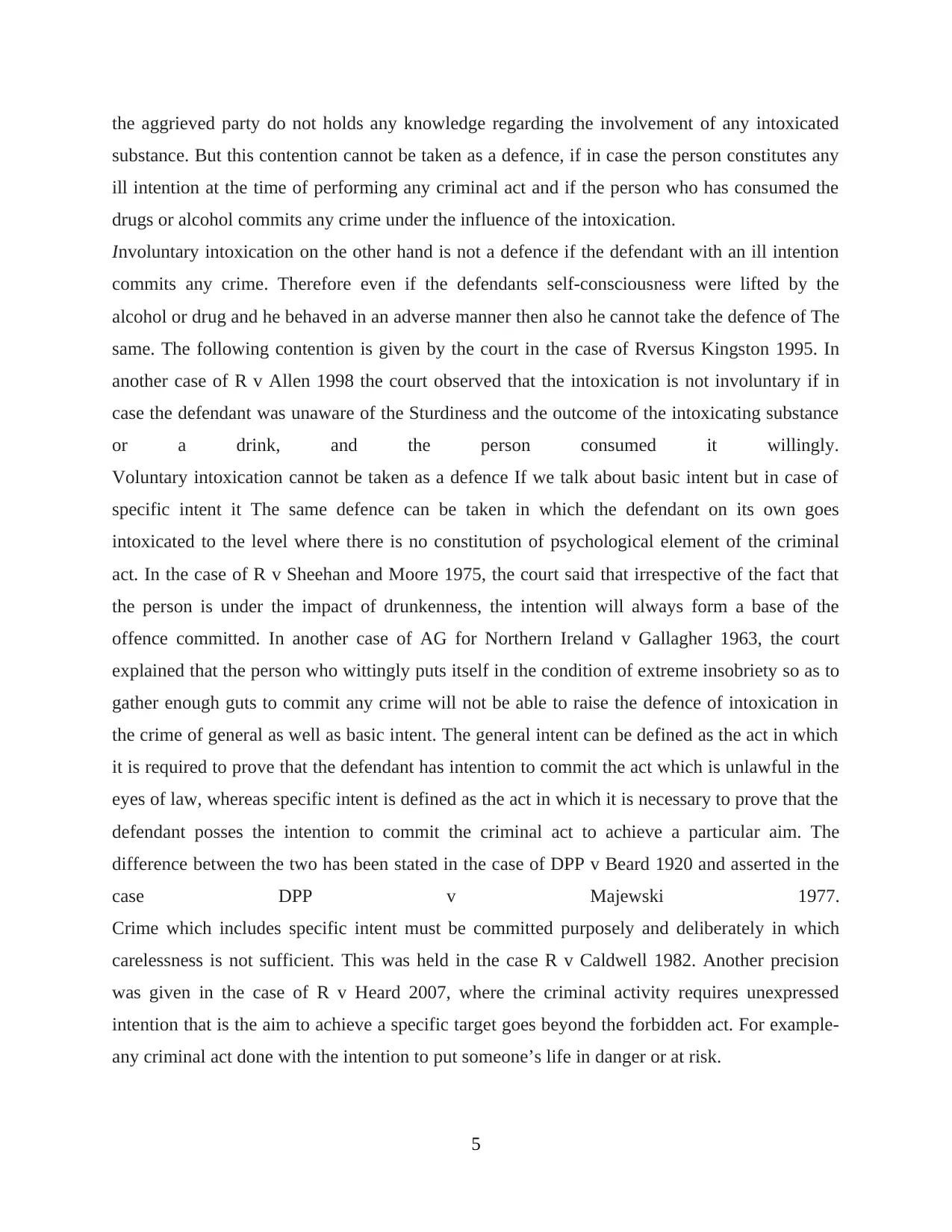
the aggrieved party do not holds any knowledge regarding the involvement of any intoxicated
substance. But this contention cannot be taken as a defence, if in case the person constitutes any
ill intention at the time of performing any criminal act and if the person who has consumed the
drugs or alcohol commits any crime under the influence of the intoxication.
Involuntary intoxication on the other hand is not a defence if the defendant with an ill intention
commits any crime. Therefore even if the defendants self-consciousness were lifted by the
alcohol or drug and he behaved in an adverse manner then also he cannot take the defence of The
same. The following contention is given by the court in the case of Rversus Kingston 1995. In
another case of R v Allen 1998 the court observed that the intoxication is not involuntary if in
case the defendant was unaware of the Sturdiness and the outcome of the intoxicating substance
or a drink, and the person consumed it willingly.
Voluntary intoxication cannot be taken as a defence If we talk about basic intent but in case of
specific intent it The same defence can be taken in which the defendant on its own goes
intoxicated to the level where there is no constitution of psychological element of the criminal
act. In the case of R v Sheehan and Moore 1975, the court said that irrespective of the fact that
the person is under the impact of drunkenness, the intention will always form a base of the
offence committed. In another case of AG for Northern Ireland v Gallagher 1963, the court
explained that the person who wittingly puts itself in the condition of extreme insobriety so as to
gather enough guts to commit any crime will not be able to raise the defence of intoxication in
the crime of general as well as basic intent. The general intent can be defined as the act in which
it is required to prove that the defendant has intention to commit the act which is unlawful in the
eyes of law, whereas specific intent is defined as the act in which it is necessary to prove that the
defendant posses the intention to commit the criminal act to achieve a particular aim. The
difference between the two has been stated in the case of DPP v Beard 1920 and asserted in the
case DPP v Majewski 1977.
Crime which includes specific intent must be committed purposely and deliberately in which
carelessness is not sufficient. This was held in the case R v Caldwell 1982. Another precision
was given in the case of R v Heard 2007, where the criminal activity requires unexpressed
intention that is the aim to achieve a specific target goes beyond the forbidden act. For example-
any criminal act done with the intention to put someone’s life in danger or at risk.
5
substance. But this contention cannot be taken as a defence, if in case the person constitutes any
ill intention at the time of performing any criminal act and if the person who has consumed the
drugs or alcohol commits any crime under the influence of the intoxication.
Involuntary intoxication on the other hand is not a defence if the defendant with an ill intention
commits any crime. Therefore even if the defendants self-consciousness were lifted by the
alcohol or drug and he behaved in an adverse manner then also he cannot take the defence of The
same. The following contention is given by the court in the case of Rversus Kingston 1995. In
another case of R v Allen 1998 the court observed that the intoxication is not involuntary if in
case the defendant was unaware of the Sturdiness and the outcome of the intoxicating substance
or a drink, and the person consumed it willingly.
Voluntary intoxication cannot be taken as a defence If we talk about basic intent but in case of
specific intent it The same defence can be taken in which the defendant on its own goes
intoxicated to the level where there is no constitution of psychological element of the criminal
act. In the case of R v Sheehan and Moore 1975, the court said that irrespective of the fact that
the person is under the impact of drunkenness, the intention will always form a base of the
offence committed. In another case of AG for Northern Ireland v Gallagher 1963, the court
explained that the person who wittingly puts itself in the condition of extreme insobriety so as to
gather enough guts to commit any crime will not be able to raise the defence of intoxication in
the crime of general as well as basic intent. The general intent can be defined as the act in which
it is required to prove that the defendant has intention to commit the act which is unlawful in the
eyes of law, whereas specific intent is defined as the act in which it is necessary to prove that the
defendant posses the intention to commit the criminal act to achieve a particular aim. The
difference between the two has been stated in the case of DPP v Beard 1920 and asserted in the
case DPP v Majewski 1977.
Crime which includes specific intent must be committed purposely and deliberately in which
carelessness is not sufficient. This was held in the case R v Caldwell 1982. Another precision
was given in the case of R v Heard 2007, where the criminal activity requires unexpressed
intention that is the aim to achieve a specific target goes beyond the forbidden act. For example-
any criminal act done with the intention to put someone’s life in danger or at risk.
5
Paraphrase This Document
Need a fresh take? Get an instant paraphrase of this document with our AI Paraphraser
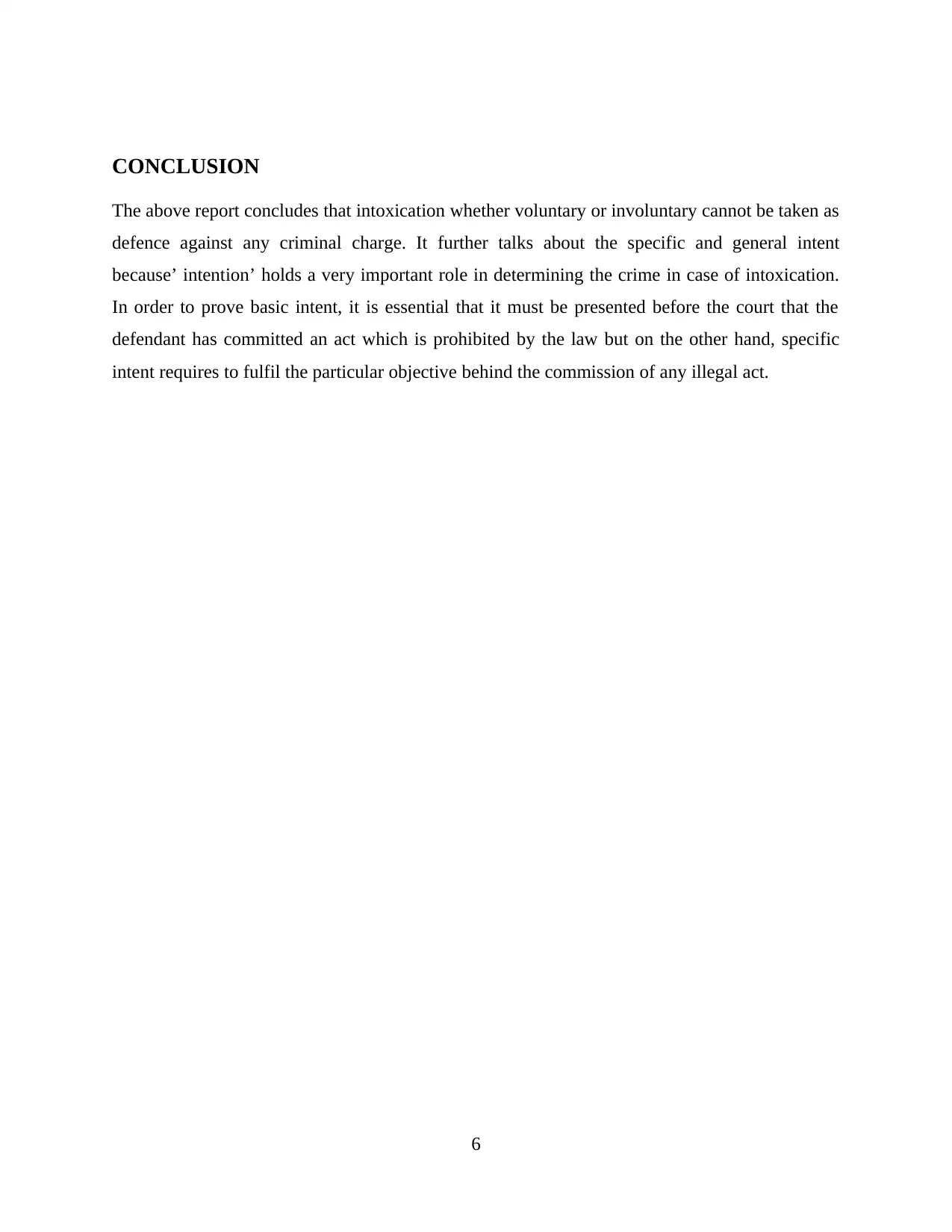
CONCLUSION
The above report concludes that intoxication whether voluntary or involuntary cannot be taken as
defence against any criminal charge. It further talks about the specific and general intent
because’ intention’ holds a very important role in determining the crime in case of intoxication.
In order to prove basic intent, it is essential that it must be presented before the court that the
defendant has committed an act which is prohibited by the law but on the other hand, specific
intent requires to fulfil the particular objective behind the commission of any illegal act.
6
The above report concludes that intoxication whether voluntary or involuntary cannot be taken as
defence against any criminal charge. It further talks about the specific and general intent
because’ intention’ holds a very important role in determining the crime in case of intoxication.
In order to prove basic intent, it is essential that it must be presented before the court that the
defendant has committed an act which is prohibited by the law but on the other hand, specific
intent requires to fulfil the particular objective behind the commission of any illegal act.
6
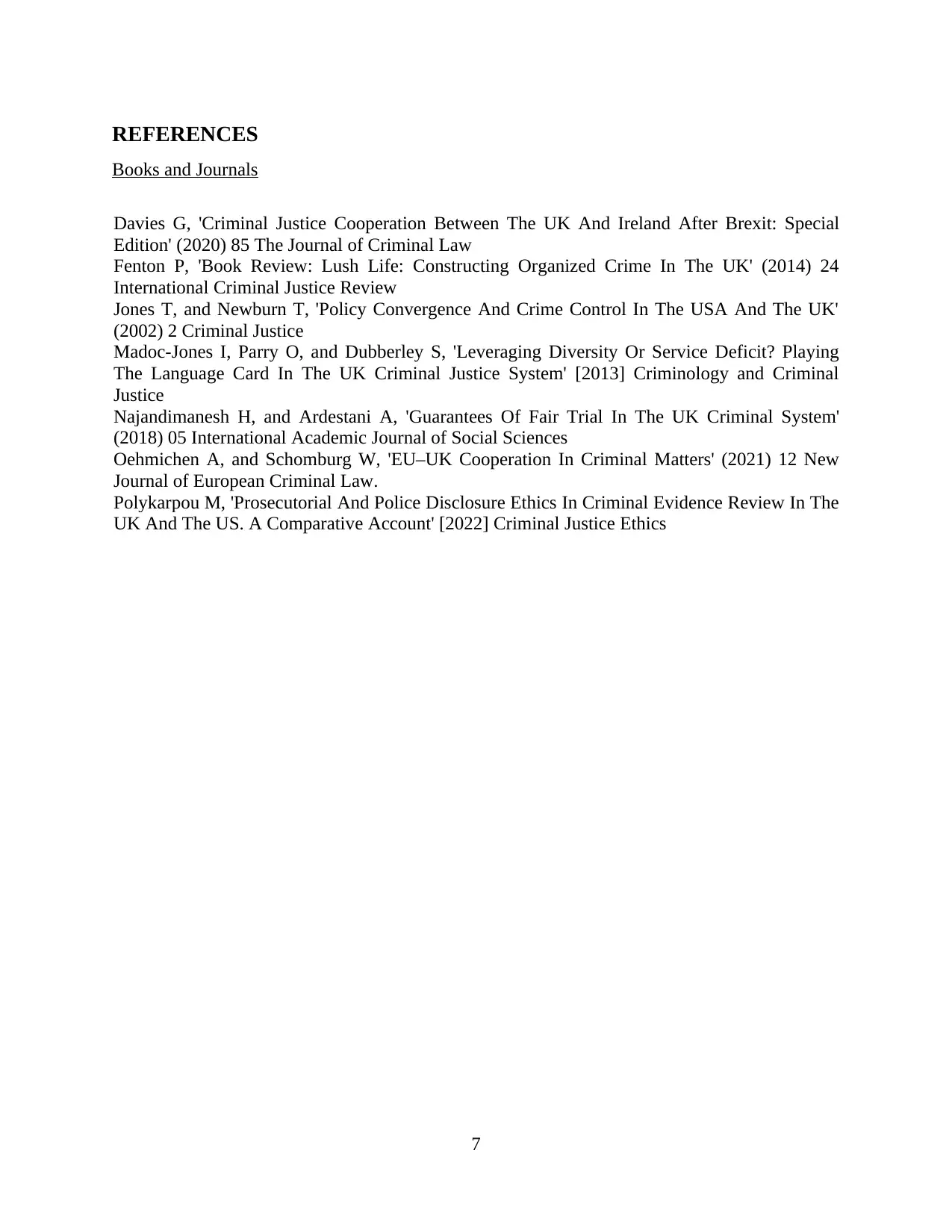
REFERENCES
Books and Journals
Davies G, 'Criminal Justice Cooperation Between The UK And Ireland After Brexit: Special
Edition' (2020) 85 The Journal of Criminal Law
Fenton P, 'Book Review: Lush Life: Constructing Organized Crime In The UK' (2014) 24
International Criminal Justice Review
Jones T, and Newburn T, 'Policy Convergence And Crime Control In The USA And The UK'
(2002) 2 Criminal Justice
Madoc-Jones I, Parry O, and Dubberley S, 'Leveraging Diversity Or Service Deficit? Playing
The Language Card In The UK Criminal Justice System' [2013] Criminology and Criminal
Justice
Najandimanesh H, and Ardestani A, 'Guarantees Of Fair Trial In The UK Criminal System'
(2018) 05 International Academic Journal of Social Sciences
Oehmichen A, and Schomburg W, 'EU–UK Cooperation In Criminal Matters' (2021) 12 New
Journal of European Criminal Law.
Polykarpou M, 'Prosecutorial And Police Disclosure Ethics In Criminal Evidence Review In The
UK And The US. A Comparative Account' [2022] Criminal Justice Ethics
7
Books and Journals
Davies G, 'Criminal Justice Cooperation Between The UK And Ireland After Brexit: Special
Edition' (2020) 85 The Journal of Criminal Law
Fenton P, 'Book Review: Lush Life: Constructing Organized Crime In The UK' (2014) 24
International Criminal Justice Review
Jones T, and Newburn T, 'Policy Convergence And Crime Control In The USA And The UK'
(2002) 2 Criminal Justice
Madoc-Jones I, Parry O, and Dubberley S, 'Leveraging Diversity Or Service Deficit? Playing
The Language Card In The UK Criminal Justice System' [2013] Criminology and Criminal
Justice
Najandimanesh H, and Ardestani A, 'Guarantees Of Fair Trial In The UK Criminal System'
(2018) 05 International Academic Journal of Social Sciences
Oehmichen A, and Schomburg W, 'EU–UK Cooperation In Criminal Matters' (2021) 12 New
Journal of European Criminal Law.
Polykarpou M, 'Prosecutorial And Police Disclosure Ethics In Criminal Evidence Review In The
UK And The US. A Comparative Account' [2022] Criminal Justice Ethics
7
⊘ This is a preview!⊘
Do you want full access?
Subscribe today to unlock all pages.

Trusted by 1+ million students worldwide
1 out of 9
Related Documents
Your All-in-One AI-Powered Toolkit for Academic Success.
+13062052269
info@desklib.com
Available 24*7 on WhatsApp / Email
![[object Object]](/_next/static/media/star-bottom.7253800d.svg)
Unlock your academic potential
Copyright © 2020–2025 A2Z Services. All Rights Reserved. Developed and managed by ZUCOL.





